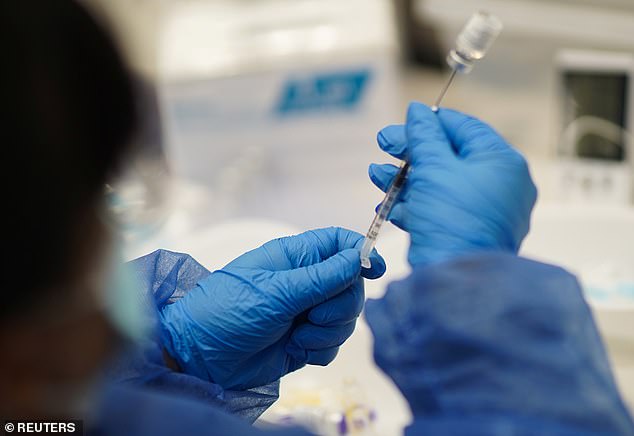The benefits of coronavirus vaccines far outweigh a very rare risk of Bell’s palsy, a study suggests.
Bell’s palsy is the sudden onset of one-sided facial paralysis, and in the majority of cases the condition resolves itself within six months without treatment.
Research suggests a small number of cases have been reported in clinical trials of some Covid vaccines, but analysis of the link has come to conflicting conclusions.
In the US, the Federal Drug Administration (FDA) did not consider there to be a clear link with the two mRNA vaccines – the Pfizer/BioNTech and Moderna jabs.
Acute partial facial paralysis has been reported by the European Medicines Agency as a rare side effect of both vaccines, which are being used in the UK.
Meanwhile current prescribing information for China’s CoronaVac jab, which is not being used in the UK, does not list Bell’s palsy as a rare adverse event – but new findings mean warnings will now be included on the potential association.
In the new research, published in The Lancet Infectious Diseases journal, researchers analysed cases of the condition related to the two approved vaccines in Hong Kong – CoronaVac and the Pfizer jab.

Meanwhile current prescribing information for China’s CoronaVac jab, which is not being used in the UK, does not list Bell’s palsy as a rare adverse event – but new findings mean warnings will now be included on the potential association
Bell’s palsy cases were included in the analysis if they occurred within 42 days of a first or second vaccine dose.
Researchers also conducted a case-control study using electronic health records databases including 298 Bell’s palsy cases and 1,181 matched controls.
Between February 23 and May 4 this year, 28 clinically confirmed cases of Bell’s palsy were identified among the 451,939 people who received at least a first dose of CoronaVac.
What is Bell’s palsy?
Bell’s palsy is a condition that causes temporary weakness or paralysis of the muscles in one side of the face.
It is a rare condition which is believed to affect around one in 5,000 people each year.
It is is believed to occur when the nerve that controls the muscles in your face becomes compressed.
The exact cause is unknown, although it’s thought to be because the facial nerve becomes inflamed, possibly due to a viral infection. Variants of the herpes virus may be responsible.
Around seven out of 10 people with Bell’s palsy make a complete recovery, with or without treatment.
Most people notice an improvement in their symptoms after about two to three weeks. However, a complete recovery can take between three and six months.
Advertisement
Sixteen cases were identified among the 537,205 individuals who received at least a first dose of the Pfizer vaccine.
Experts analysed data from 2010-20, and estimated the background risk of Bell’s palsy in Hong Kong – around 27 cases per 100,000 people per year.
The case-control study found that receiving CoronaVac was associated with 2..4 times increased risk of Bell’s palsy, whereas the Pfizer jab was not associated with a significantly increased risk.
The researchers concluded that for every 100,000 people vaccinated with CoronaVac, an additional 4.8 people may develop Bell’s palsy.
For the Pfizer/BioNTech jab, the increased risk was equivalent to an additional two cases per 100,000 people.
The researchers said more studies are needed to evaluate the association between Bell’s palsy and the Pfizer vaccine.
Lead author Professor Ian Chi Kei Wong, from the University of Hong Kong, said: ‘Our study suggests a small increased risk of Bell’s palsy associated with CoronaVac vaccination.
‘Nevertheless, Bell’s palsy remains a rare, mostly temporary, adverse event.
‘All evidence to date, from multiple studies, shows that the beneficial and protective effects of the inactivated Covid-19 vaccine far outweigh any risks.’ The mechanism by which vaccination, in very rare instances, leads to Bell’s palsy remains unclear.
Further analyses are also needed to understand whether the risk varies by sex or age, the experts said.
Source link : https://www.dailymail.co.uk/news/article-9899565/Benefits-Covid-19-vaccines-outweigh-rare-risk-Bell-s-palsy-study.html











